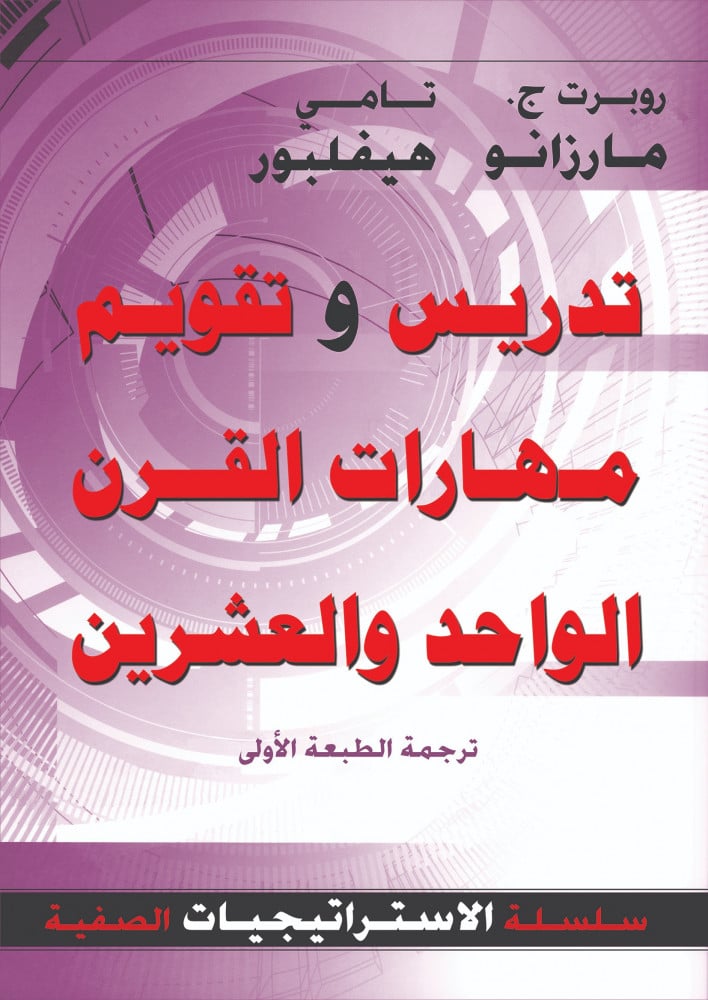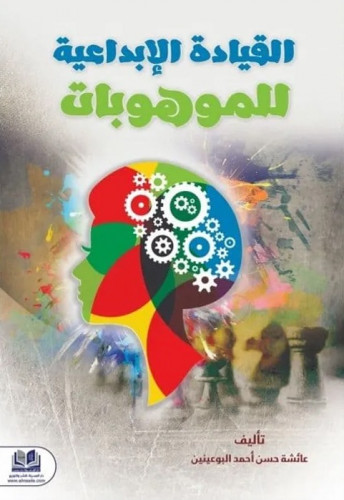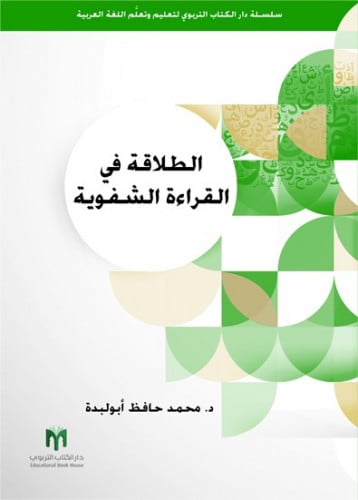AVAILABLE IN ARABIC
About This Book
As the 21st century unfolds, the pace of change in the world is accelerating. The authors believe a combination of cognitive skills (skills students will need to succeed academically) and conative skills (skills students will need to succeed interpersonally) is necessary for the 21st century. This clear, practical guide presents a model of instruction and assessment based on these skills.
Benefits
• Read relatable classroom stories that depict the presented strategies.
• Use end-of-chapter comprehension questions to help assess and reinforce understanding of the new strategies.
• Gain an appendix of rubrics for assessing cognitive and conative 21st century skills.
Topics : Assessment,Teaching Strategies
Table Of Content
ABOUTTHE AUTHORS
ABOUTMARZANORESEARCH
LABORATORY
INTRODUCTION
How to Use This Book
CHAPTER 1: THE STATUS OF THE 21ST CENTURY
Why Do We Need 21st Century Skills?
Major Frameworks
The Problem of Defining 21st Century Skills
Cognitive and Conative Skills
CHAPTER 2: RESEARCH AND THEORY
Cognitive Skill: Analyzing and Utilizing Information
Cognitive Skill: Addressing Complex Problems and Issues
Cognitive Skill: Creating Patterns and Mental Models
Conative Skill: Understanding and Controlling Oneself
Conative Skill: Understanding and Interacting With Others
Assessing 21st Century Skills
Translating Research and Theory Into Practice
PART 1: COGNITIVE SKILLS
CHAPTER 3: ANALYZING AND UTILIZING INFORMATION
Navigating Digital Sources
Identifying Common Logical Errors
Generating Conclusions
Presenting and Supporting Claims
Summary
Chapter 3: Comprehension Questions
CHAPTER 4: ADDRESSING COMPLEX PROBLEMS AND ISSUES
Focus
Divergent and Convergent Thinking
A Problem-Solving Protocol
Summary
Chapter 4: Comprehension Questions
CHAPTER 5: CREATING PATTERNS AND MENTAL MODEI S
Identifying Basic Relationships Between Ideas
Creating Graphic Representations
Drawing and Sketching
Generating Mental Images
Conducting Thought Experiments
Performing Mental Rehearsal
Summary
Chapter 5: Comprehension Questions
PART 11: CONATIVE SKILLS
CHAPTER 6: UNDERSTANDING AND CONTROLLING ONESELF
Becoming Aware of the Power of Interpretations
Cultivating Useful Ways of Thinking
Avoiding Negative Ways of Thinking
Summary
Chapter 6.' Comprehension Questions
CHAPTER 7: UNDERSTANDING AND INTERACTING WITH OTHERS
Perspective Taking
Responsible Interaction
Controversy and Conflict Resolution
Summary
Chapter 7: Comprehension Questions
CHAPTER 8: ASSESSMENT
Beginning With a Scale
Striving for Clarity and Precision
Assigning Summative Scores
Summary
Chapter 8: Comprehension Questions
EPILOGUE
Technology
Shift in Accountability
Proficiency-Based System
APPENDIX A: ANSWERS TO COMPREHENSION QUESTIONS
Answers to Chapter 3: Comprehension Questions
Answers 10 Chapter 4: Comprehension Questions
Answers to Chapter 5: Comprehension Questions
Answers to Chapter 6: Comprehension Questions
Answers to Chapter 7: Comprehension Questions
Answers to Chapter 8: Comprehension Questions
APPENDIX B: SCALES FOR 21ST CENTURY SKII S
Analyzing and Utilizing Information: Navigating Digital Sources
Analyzing and Utilizing Information: Identifying Common Logical Errors
Analyzing and Utilizing Information: Generating Conclusion
Analyzing and Utilizing Information: Presenting and Supporting Claims
Addressing Complex Problems and Issues: Focus
Addressing Complex Problems and Issues: Divergent and Convergent Thinking
Addressing Complex Problems and Issues: A Problem-Solving Protocol
Creating Patterns and Mental Models: Identifying Basic Deaconships Between Ideas
Creating Patterns and Mental Models: Creatines Graphic Representations
Creating Patterns and Mental Models: Drawing and Sketching
Creating Patterns and Mental Models: Generating Mental Images
Creating Patterns and Mental Models: Conducting Thought Experiments
Creating Patterns and Mental Models: Performing Mental Rehearsal
Understanding and Controlling Oneself: Becoming Aware of the Power of Interpretations
Understanding and Controlling Oneself: Cultivating Useful Ways 01 Thinking
Understanding and Controlling Oneself: Avoiding Negative Ways of Thinking
Understanding and Interacting With Others: Perspective Taking
Understanding and Interacting With Others: Responsible Interaction
Understanding and Interacting With Others: Controversy and Conflict Resolution
REFERENCES AND RESOURCES
INDEX
About the Authors
Robert J. Marzano:

Robert J. Marzano, PhD, is the cofounder and chief academic officer of Marzano Research in Denver, Colorado. During his fifty years in the field of education, he has worked with educators as a speaker and trainer and has authored more than forty books and three hundred articles on topics such as instruction, assessment, writing and implementing standards, cognition, effective leadership, and school intervention. His books include The Art and Science of Teaching, The Handbook for the New Art and Science of Teaching, The New Art and Science of Teaching Writing, The New Art and Science of Teaching Reading, The New Art and Science of Classroom Assessment, Leaders of Learning, The Classroom Strategies Series, A Handbook for High Reliability Schools, Awaken the Learner, and Managing the Inner World of Teaching.
His practical translations of the most current research and theory into classroom strategies are known internationally and are widely practiced by both teachers and administrators. He received a bachelor’s degree from Iona College in New York, a master’s degree from Seattle University, and a doctorate from the University of Washington.
To learn more about Dr. Marzano’s work, visit www.marzanoresearch.com.
Tammy Heflebower:

Tammy Heflebower, EdD, is a highly sought-after school leader and consultant with vast experience in urban, rural, and suburban districts throughout the United States, Canada, the Netherlands, Denmark, and Australia. Dr. Heflebower has served as an award-winning classroom teacher, building leader, district leader, regional professional development director, and national and international trainer. She has also been an adjunct professor of curriculum, instruction, and assessment at several universities and a prominent member and leader of numerous statewide and national educational organizations.
She is lead author of an award-winning book titled A School Leader’s Guide to Standards-Based Grading, co-author of Collaborative Teams That Transform Schools: The Next Step in PLCs, and Teaching & Assessing 21st Century Skills, as well as contributing author to more than a dozen other books and publications.
Dr. Heflebower holds a bachelor of arts from Hastings College, where she was honored as Outstanding Young Alumna and inducted into the athletic hall of fame. She has a master of arts from UNO and her educational administrative endorsement and doctorate from UNL.
ISBN: 9786038147238
Author: Robert J. Marzano & Tammy Heflebower
Publisher: Educational Book House
Publish Year: 2016
Size: 17*24cm
Pages number: 384













